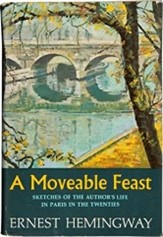Are you looking for a way to describe changing life circumstances? Maybe you’re looking for the right way to word a moving holiday like Easter? If so, you could call it a “movable feast.” This post unpacks the meaning and origin of this expression.
Meaning
The expression “movable feast” describes an event that changes the date or day each year. For example, The Christian holidays of Easter and Christmas are “movable feasts.” Easter occurs on a different date each year in a specific cycle. Christmas happens on the same date but on other days.
In the last 50-years or so, the phrase has also described the changes we experience during our lifetime and the difference they make to our life experience.
Example Usage
“I love Easter; it’s the one time of year where life is unpredictable. It changes dates every year, making it my favorite movable feast.”
“We had our anniversary on a Saturday last year, but it’s a movable feast, and it’s on a Sunday this year.
“My birthday is my favorite movable feast of the year. It’s always on a different day of the week, and it keeps me on my toes.”
“Christmas day is always on a different day of the week each year, but it’s always on the 25th of December. Does that make it a movable feast?”
“The annual political rally is a movable feast. We never know when they will schedule it or where.”
“We decided to name our catering company ‘Movable Feast’ since we’re catering to all types of functions on any day of the year.”


Origin
The origin of the expression “movable feast” comes from the late 1800s. The first appearance of the phrase in print doesn’t have any religious reference. Instead, it refers to how things tend to change over time as we progress with our life experience.
The first use of the expression appears in the Bismarck Tribune in 1882, in an article titled, “The Ideal Woman.”
"The most sublime creation of modern times is the ideal woman of the average man. She is a migratory bird, a sort of movable feast as it were."
However, the most notable use of the expression, and the reason for the say8ings inclusion into modern language comes from author, Ernest Hemmingway. His memoirs, titled, “A Movable Feast,” capture his life in Paris during the 1920s.
"If you are lucky enough to have lived in Paris as a young man, then wherever you go for the rest of your life, it stays with you, for Paris is a moveable feast."
Phrases Similar to Moveable Feast
- Floating holiday.
Phrases Opposite to Moveable Feast
- Fixed event date.
What is the Correct Saying?
- Movable feast.
Ways People May Say Moveable Feast Incorrectly
The phrase “movable feast” doesn’t refer to takeaway foods or the action of moving food around. It describes an annual, biannual, monthly, or weekly event that doesn’t always adhere to a fixed calendar schedule.
Acceptable Ways to Phrase Moveable Feast
You can use the “movable feast” when referring to a day of rest or a feast that doesn’t adhere to a fixed date on the Gregorian or Julian calendar. For instance, the Christian Easter holiday typically falls between the days of March 22nd and May 10th.
Since Easter is a day of feasting in the Christian faith, we can describe it as a day of “movable feast.” The saying applies to many occasions where events may take place on a different day from the previous year. For instance, your Xmas office party might be on December 22nd this year and on December 21st the following year, depending on the situation at work.